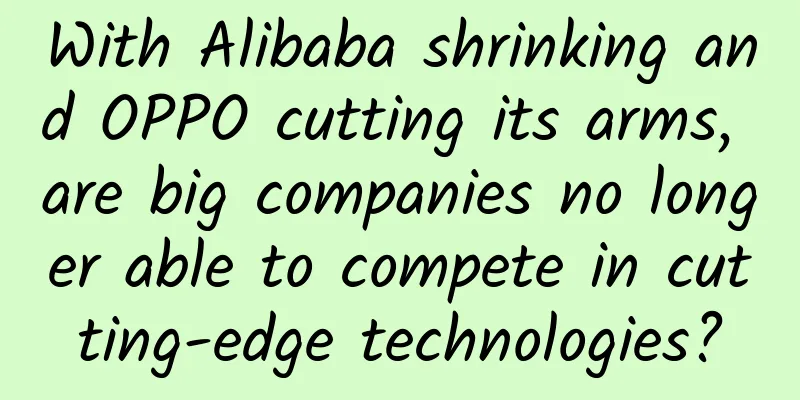From Facebook to Google and Microsoft, why are everyone investing in artificial intelligence technology?

|
Techcrunch recently published an article titled "Investing in AI offers more rewards than risks." The article argues that, just like information technology, artificial intelligence will be indispensable to every industry in the future, and the benefits of investing in artificial intelligence technology outweigh the risks. Below is the main content of the article. It is difficult to predict how artificial intelligence technology will change in the next 10 to 20 years, but it is certain that this technology will bring many benefits. By 2018, robots will take over the jobs of more than 3 million people; by 2020, intelligent machines will become the top investment priority for more than 30% of corporate CIOs. From news writing to customer service, many jobs have been replaced by increasingly advanced artificial intelligence that is increasingly able to replicate human experience and abilities. Once seen as the future of technology, artificial intelligence is now here, and the only question left is how to bring it to the mass market. Over time, some industries have benefited from AI technology. In the process, AI technology has gradually improved and will become more powerful and useful in more and more applications. Now, those companies that can afford to make significant investments in AI are setting the trend, while those that cannot afford to invest in this field will be in danger of being left behind. Risks and Rewards One might argue that it is unpredictable whether the risks or benefits of investing in artificial intelligence will be greater, but analysts predict that by 2020, 5% of global economic transactions will be handled by autonomous software. The future of AI depends on companies that are willing to take risks and continue to invest in the field. Many advances in AI come from the military field. The US government's budget for the development of drones next year is $4.6 billion, and the manned aircraft currently used by the US military will be replaced by drones in the future. AI drones only need to set a destination, and they will be able to automatically evade air defense systems and reach their destination, while any fatal decisions are still made by humans. Currently, the general view in the industry is that developing safe AI technology is a better choice than falling behind other companies in the field of AI, because the former is more risky. In theory, research institutions such as the Massachusetts Institute of Technology in the United States and the University of Oxford in the United Kingdom are working hard to map the human brain and try to imitate the workings of the human brain. Their research results provide two different research paths - creating an artificial intelligence that replicates the human brain, or simulating the actual human brain. Simulating the actual human brain will bring some ethical issues and concerns. While these questions remain unanswered, the benefits that AI systems are already bringing to all industries will drive some of the largest companies to continue investing in this area. It is easy to understand that just as information technology is now indispensable to almost every industry, so will AI technology in the future. The future of computing Until now, most AI systems have been programmed to perform a specific task. However, the future of AI will depend on true machine learning. In other words, AI in the future will no longer rely on direct commands to understand the tasks it is given. Traditional artificial intelligence is relatively narrow and can only complete given tasks according to pre-written programs. However, Google 's DeepMind artificial intelligence system does not have specific modules set up to complete given tasks, but is designed as an automatic learning system. DeepMind is impressive after AlphaGo defeated the world Go champion Lee Sedol. Olli, an autonomous vehicle equipped with the BIM Watson artificial intelligence system, can learn by monitoring the behavior of passengers and interacting with them. It will store every passenger's request and destination and use this information to serve passengers in future driving. As new sensors are added, Olli becomes more and more intelligent. But can these AI systems really do what Google wants them to do? For example, can it predict end-user purchasing habits better than current software? Can it optimize supply chain transactions by automatically correlating past models? These tasks are more complex than playing games or driving a car. The application scope of artificial intelligence is expanding. For example, it can already predict people's health problems. In the near future, more advanced artificial intelligence applications will become a reality. Soon, artificial intelligence will be able to mimic complex human decision-making processes, such as providing investment advice or prescribing medicine to patients. In fact, as true machine learning continues to advance, some more complex and dangerous jobs (such as truck driving) will be completely taken over by robots, which will lead to a new industrial revolution. By then, people will be liberated from repetitive work. The risks of not investing in AI The returns and risks of investment are both uncertain. In business, the known risk of all new things is uncertainty itself. Therefore, the risk mainly comes from wrong investment. So, in business, people generally think about all unfamiliar new things, that the risk of falling behind because of losing the initiative is greater than the risk of participating in new things. As a winner of Toutiao's Qingyun Plan and Baijiahao's Bai+ Plan, the 2019 Baidu Digital Author of the Year, the Baijiahao's Most Popular Author in the Technology Field, the 2019 Sogou Technology and Culture Author, and the 2021 Baijiahao Quarterly Influential Creator, he has won many awards, including the 2013 Sohu Best Industry Media Person, the 2015 China New Media Entrepreneurship Competition Beijing Third Place, the 2015 Guangmang Experience Award, the 2015 China New Media Entrepreneurship Competition Finals Third Place, and the 2018 Baidu Dynamic Annual Powerful Celebrity. |
<<: WeChat "Mini Programs" are going to kill apps? Entrepreneurs may not think so
Recommend
Trump gives the green light: Huawei may get Google service license in the near future
This article is reproduced from Leiphone.com. If ...
If the quilt is not right, the sleep will be in vain! What kind of quilt can provide better sleep quality?
Recently, the China Sleep Research Society releas...
How to welcome the New Year safely? Please take these health tips
New Year's Day is coming, how do you plan to ...
8 minutes to help you quickly understand data analysis (with book recommendations)
With data analysis being so popular in the past t...
An in-depth review of Durex’s red envelope fission!
The Business Card Mini Program gave out 200,000 r...
Luo Rong: "Reshaping Financial Value and Enabling Business Growth"
Luo Rong's "Reshaping Financial Value an...
Why do some people get diarrhea when they are nervous?
Planning and production Source: A Brief History E...
Nexus and compact cameras couldn't save HTC from rapid decline
HTC released a number of new products in New York...
4 practical tips for operating a Weibo account!
1. Background Whether it is radio, television, QQ...
Why do people often run counterclockwise?
running It is probably one of the most popular fo...
Empty State Interface Design for Mobile Apps
Actually, I still don't know when the Chinese...
“Severe cold + dark night”, how to make astronauts feel the warmth of returning home?
On December 4, 2022, the crew of Shenzhou XIV ret...
Forward and collect! This knowledge can save lives at critical moments
Not long ago, three children were washed away by ...
The whole process of activity operation
Everyone is familiar with event operations . It c...
The stock market surge explains the wave theory in detail
Stock market surge detailed explanation of wave t...









